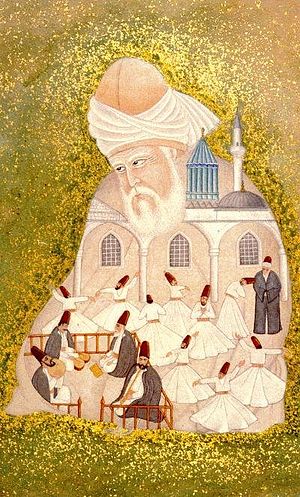Jalāl ad-Dīn Muḥammad Balkhī (Persian: جلالالدین محمد بلخى), also known as Jalāl ad-Dīn Muḥammad Rūmī (Persian: جلالالدین محمد رومی), and popularly known as Mowlānā (Persian: مولانا) but known to the English-speaking world simply as Rumi[2] (30  September 1207 – 17 December 1273), was a 13th-century Persian (Tajik) Muslim poet, jurist, theologian, and Sufi mystic. Rūmī is a descriptive name meaning “the Roman” since he lived most of his life in an area called Rūm because it was once ruled by the Eastern Roman Empire.
September 1207 – 17 December 1273), was a 13th-century Persian (Tajik) Muslim poet, jurist, theologian, and Sufi mystic. Rūmī is a descriptive name meaning “the Roman” since he lived most of his life in an area called Rūm because it was once ruled by the Eastern Roman Empire.
Rumi’s works are written in the New Persian language. A Persian literary renaissance (in the 8th/9th century) started in regions of Sistan, Khorāsān and Transoxiana and by the 10th/11th century, it reinforced the Persian language as the preferred literary and cultural language in the Persian Islamic world. Rumi’s importance is considered to transcend national and ethnic borders. His original works are widely read in their original language across the Persian-speaking world. Translations of his works are very popular in other countries. His poetry has influenced Persian literature as well as Urdu, Punjabi and other Pakistani languages written in Perso/Arabic script e.g. Pashto and Sindhi. His poems have been widely translated into many of the world’s languages and transposed into various formats. In 2007, he was described as the “most popular poet in America.”
See below for some of Rumi’s noted quotes and poetry (Wisdom):
“Everyone has been made for some particular work, and the desire for that work has been put in every heart.”
“Observe the wonders as they occur around you. Don’t claim them. Feel the artistry moving through and be silent.”
“Every tree and plant in the meadow seemed to be dancing, those which average eyes would see as fixed and still”
“Everyone sees the unseen in proportion to the clarity of his heart, and that depends upon how much he has polished it. Whoever has polished it more sees more – more unseen forms become manifest to him.”
“You are quaffing drink from a hundred fountains: whenever any of these hundred yields less, your pleasure is diminished. But when the sublime fountain gushes from within you, no longer need you steal from the other fountains.”
“In your light I learn how to love.
In your beauty, how to make poems.
You dance inside my chest,
where no one sees you.”
“Try and be a sheet of paper with nothing on it.
Be a spot of ground where nothing is growing,
where something might be planted,
a seed, possibly, from the Absolute.”
Wikipedia contributors. “Rumi.” Wikipedia, The Free Encyclopedia. Wikipedia, The Free Encyclopedia, 12 Feb. 2011. Web. 13 Feb. 2011.
Related articles
- Rumi…..inspirational [Nighet Nasim Riaz] (ecademy.com)
- This Marriage – Rumi (peddlerofdreams.wordpress.com)
- Life lessons from Emerson and Rumi (davidglarson.com)
- Whirling Dervishes Celebrate Rumi Anniversary (huffingtonpost.com)
- Transcript of Rumi Forum Discussion with Akbar Ahmed on American Identity and Islam (craigconsidine.wordpress.com)
- Quote of the Day: Rumi and Hafiz (barefootbarn.wordpress.com)

Leave a Reply
Want to join the discussion?Feel free to contribute!